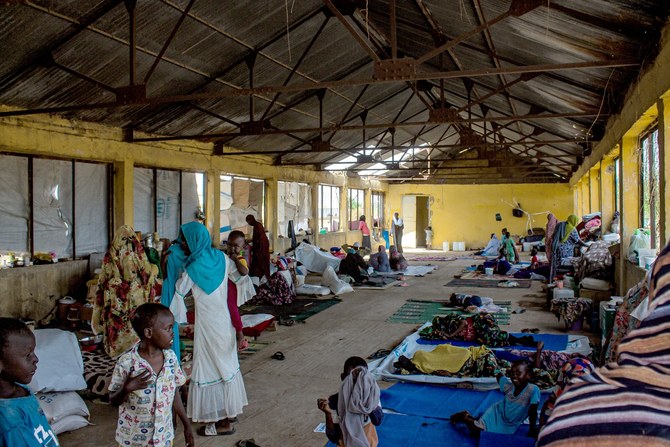
- ARAB NEWS
- 01 May 2024

The Sudan crisis, caused by the conflict between Sudanese army factions and the Rapid Support Forces, has raised many questions about the position of the international community, specifically the major powers, in regard to this explosive situation. This conflict between warring Sudanese factions over influence and control of the country has created a situation that is perilous and thrown not only Sudan but also the African continent into a security vortex with far-reaching consequences, hence necessitating serious action from the international community.
The crisis cannot be separated from other major conflicts, especially the Western crisis led by the US and Europe on the one hand and Russia on the other, as well as the “soft” conflict between China and the US. Despite the geographical distance of these actors from the mentioned conflict zones, the intertwining of international interests makes them the epicenter of the conflicts.
In addition, the initiatives presented to solve the crisis in Sudan clash directly with those other conflicts and prevent, rather than assist with, the resolution of the Sudanese crisis. Three main initiatives have been presented. The first is the one put forward by the African Union. The AU is the primary regional organization concerned with this crisis and it fears it spreading to other countries. Many countries have already suffered deeply because of this crisis. The flow of refugees and the adverse political, security and economic ramifications of the crisis on the African continent have hit many countries hard.
Secondly, there is the initiative to boost intra-African trade to address the economic repercussions of the Sudanese crisis on the African continent.
The Kingdom’s efforts are appreciated in Sudanese political circles and there is public confidence in Riyadh and its goals
Dr. Mohammed Al-Sulami
Thirdly, there is Saudi Arabia’s Jeddah initiative, which aims to resolve the differences between the rival Sudanese forces, while underlining the need to respect Sudan’s sovereignty, preserve its unity and territorial integrity, and agree that the interests and safety of the Sudanese people are the key priority. In addition, the initiative emphasizes the need to protect Sudanese civilians at all times, allow civilians to safely leave areas where hostilities are taking place, allow humanitarian organizations to evacuate the wounded and sick without discrimination, and it calls on fighting factions not to recruit children.
Despite the difficulties and challenges, the Kingdom may again need to revive its initiative and work to ensure its success unilaterally, given its positive image in Sudan. In addition, the Kingdom’s efforts are appreciated in Sudanese political circles and there is public confidence in Riyadh and its goals.
While the Kingdom called on some of the rival political forces in Sudan to attend the Jeddah meeting, some Sudanese observers believe that it is necessary to involve some other forces, especially those that are active on the ground. These include representatives of social initiatives and civil society institutions that are independent and not affiliated with any of the main parties to the conflict. There is a need to try a new approach in order to spare the blood of brothers in Sudan.
Sudanese society does not trust the international community’s forces much and believes that they are seeking to manage the crisis according to Western interests rather than to resolve it. By contrast, the Kingdom aims to solve the crisis in order to achieve security and stability in the region. Riyadh’s policy has clearly been created by Saudi experts who have a deep understanding of the regional situation.
In light of the international community’s failure in the Middle East, the Sudanese people strongly and understandably fear and distrust international nongovernmental organizations and have the right to be afraid of their goals. This is a result of the negative role played by many of these organizations in countries such as Yemen, Somalia and others. The obstruction of the arrival of humanitarian aid for many reasons, including the insistence of NGOs on the presence and involvement of their officials in aid delivery, has raised a lot of suspicions about the goals of some of them.
The Sudanese people strongly and understandably fear and distrust international nongovernmental organizations
Dr. Mohammed Al-Sulami
To overcome this dilemma, the Kingdom has proposed that all humanitarian aid can be sent to Jeddah Islamic Port, with Riyadh taking responsibility for coordinating with Sudanese civil society organizations, along with the Saudi aid agency KSrelief, which plays a major positive role in many affected areas and has built up vast experience and professional capabilities in this regard.
The Sudanese people also rely greatly on the Kingdom to stop the fighting in Yemen. Saudi Arabia has many influential tools to achieve this, especially since it chairs the current session of the Organization of Islamic Cooperation. Therefore, it may merge all the initiatives put forward into one that achieves the aspirations of the brotherly Sudanese people.
To achieve this end, the Kingdom could invite Sudanese from different political factions and civil society organizations to come to Saudi Arabia in order to build trust and confidence between these elements and so that a comprehensive roadmap based on the integration of the mentioned initiatives could be fashioned to lead Sudan out of its current perilous situation. This is a critical task that needs to happen, especially as the Kingdom is now at the heart of regional developments in line with its foreign policy recalibration and Vision 2030, which hinges on establishing peace, security and economic development across the Middle East.
The region cannot wait for the international community to come to its rescue, especially as major powers have other security considerations and are disunited when it comes to their strategic interests and considerations. Thus, regional powers must take the lead, with the Kingdom best placed given its positive relations, economic weight and ability to ensure outcomes and settlements are reached and fulfilled.